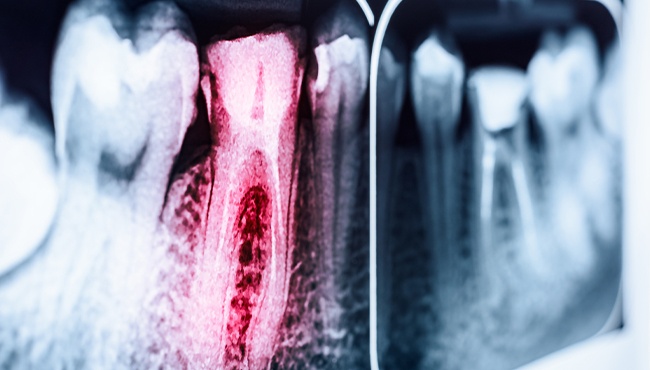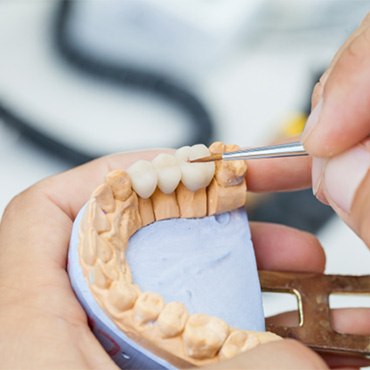Root Canal Therapy – Buffalo Grove, IL
Don’t Let Your
Tooth Fail

If you have recently gotten the news that you need a root canal, also known as endodontic treatment, there is no need to worry. In fact, it’s actually good news -- the root canal is a common procedure that saves millions of teeth from being extracted each year. Keep reading to find out more about how the treatment works, why it’s necessary, and what you can expect from the procedure from your dentist in Buffalo Grove, Dr. Natalya Nagornaya.
Why Choose Countryside Dental for Root Canal Therapy?
- Trained Dentist with Over 14 Years of Experience
- Caring Dentist and Team Dedicated to Comfort
- In-Network with Most Major PPO Dental Plans
When You Need a Root Canal

Root canals are necessary when decay or injury reaches the interior, or the pulp, of the tooth. By this point, a simple filling will not provide sufficient help to stop damage and restore the tooth’s original strength.
Some of the warning signs that may indicate the need for a root canal include:
- An aching, throbbing tooth
- Lingering sensitivity to heat, cold, and pressure
- A dark, black, or gray tooth
- A bad smell emanating from the tooth
- A broken or injured tooth with a visible root
- A pimple-like bump on the gums below the tooth
If you are experiencing any of these symptoms of an infected tooth, do not delay in seeking treatment. The tooth will not get better on its own -- and it’s very possible it can still be rescued with root canal therapy.
What to Expect From Root Canal Surgery

If you need to have a root canal procedure, you can typically expect the treatment to be carried out over the course of 2 to 3 visits to our office. Some root canal procedures can be completed in a single appointment, however.
In the first appointment, your dentist will remove all the diseased tissue from the interior of the tooth, fill it with a rubber-like material called gutta percha, and usually place a temporary filling while your permanent crown or restoration is crafted in our partner lab. A couple of weeks later, you will return to our office for the final restoration of the tooth, when it is returned to full function.
The recovery for a root canal usually lasts several days. After the numbing wears off, you may experience slight discomfort until you have completely healed. Inflammation and minor bleeding are common, too. Your dentist can prescribe something to help manage the pain in the meantime, if necessary.
Do Root Canals Hurt?

Root canal therapy has developed the reputation of being painful -- even though the discomfort of the original toothache is far more likely to cause discomfort than the actual procedure. Thanks to modern anesthesia and improved restoration methods, today’s root canals are unlikely to cause any pain at all. Please feel free to talk to us about how we can make you feel more comfortable if anxiety is an issue for you in the lead up to your appointment.
Let Us Save Your Smile

If you have an aching or injured tooth, don’t wait to seek the restorative treatment you need. Root canal therapy can rescue a tooth from extraction to help you keep the smile you were born with intact. Contact us to schedule an appointment at Countryside Dental today!
Understanding the Cost of Root Canals

The cost of root canals in Buffalo Grove can vary based on a number of factors, ranging from the location of the infected tooth to the material your dental crown is crafted from. While paying to restore a single tooth’s health may feel like a pricey investment, it’s worthwhile for a number of reasons, including the easing of your discomfort and the preservation of your natural set of teeth. Learn more about some of the other factors that will play a role in the price of your procedure by reading below.
Factors That Can Influence the Cost of Root Canals

There are three major details that will influence the cost of root canal treatment, which our team will determine once we’ve had an opportunity to examine your smile and create a treatment plan. These factors are:
- The location of your tooth. Molars are typically more difficult and take longer to treat than front teeth due to their anatomy. As such, they tend to cost more to treat.
- The complexity of your situation and extent of the infection. While we perform most root canals in-house, more complex cases may require specialist care from an endodontist. They typically have higher fees than us.
- Follow-up appointments and additional treatments. In most cases, a dental crown will need to be placed as added support and protection following the root canal procedure. This will incur a separate cost, which our team will outline for you before you commit to treatment.
Is It Cheaper to Get a Tooth Extracted?

While it may seem like the less costly option to just extract a tooth instead of have it treated, it’s important to consider the services that will be necessary following your decision to remove it. You’ll need to then replace your extracted tooth with a dental implant or dental bridge, which will ultimately cost more than preserving your tooth with root canal treatment.
Does Dental Insurance Cover Root Canal Treatment?

Before your treatment, our team at Countryside Dental will provide you with a detailed estimate based on the benefits pre-check that we send to your insurance company. This will allow us to highlight the breakdown of what your insurance will agree to pay as well as what will be expected of you to pay out-of-pocket. In many cases, dental insurance plans will agree to pay for at least a portion of the procedure.
Other Options for Making Root Canal Treatment More Affordable

In addition to helping you maximize your dental insurance coverage, we also offer flexible third-party financing through CareCredit. This is excellent for patients who are either uninsured or who have a larger out-of-pocket expense that they can’t pay in one payment. CareCredit offers 12, 24, or 36-month low-to-no interest financing, allowing you to make monthly payments that fit within your budget.
Root Canal FAQs
Are Root Canals Painful?
Root canals have a reputation for being painful, but the truth is that they aren't as uncomfortable as you might imagine. Thanks to modern dental techniques and technology, the procedure is usually no more painful than getting a filling! Dr. Nagornaya uses a local anesthetic to numb the area, so you’ll feel little to no discomfort during the process.
After the procedure, some patients have mild soreness or sensitivity, but this can be taken care of with generic pain relievers and will typically fade within a few days. Our team will do everything we can to ensure you're comfortable throughout your root canal treatment, so there’s no need to worry.
Are Root Canals Safe?
Yes, root canals are a safe and routine dental procedure when performed by skilled professionals like Dr. Nagornaya. This treatment is designed to save your natural teeth and prevent the spread of infection, not cause more issues. Over the course of decades, the procedure itself has undergone several changes that make it more efficient and less invasive.
In addition, the materials used in a root canal are completely biocompatible, and our team follows strict sterilization protocols to ensure your safety. At Countryside Dental, your smile is in good hands!
How Long Does a Root Canal Take?
The duration of a root canal procedure largely depends on the complexity of your case, but most can be completed in one to two hours. If multiple roots need to be treated or if the infection is severe, the procedure might take longer or require a second visit.
During the appointment, Dr. Nagornaya will remove the infected pulp, clean the inside of the tooth, and fill it with a special rubber-like material called gutta-percha. After the root canal, we’ll place a temporary crown over the tooth, and you’ll need to return for a permanent one soon after. So, the whole process could take multiple visits depending on your case, but it’s not typical.
How Long Do Root Canals Last?
When properly cared for, a root canal can last a lifetime. The key is maintaining good oral hygiene and attending regular dental checkups. After the procedure, Dr. Nagornaya will recommend placing a crown over the treated tooth to provide added protection and strength. With this, the tooth can remain healthy and functional for many years.
However, like all dental work, the lifespan of your root canal will also depend on things like lifestyle habits, the presence of other dental issues, and your overall health. As long as you take care of yourself and form a good oral hygiene routine, you should get many, many years out of your restoration.




